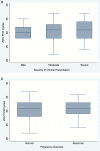Maternal Zika Virus Disease Severity, Virus Load, Prior Dengue Antibodies, and Their Relationship to Birth Outcomes
- PMID: 28535184
- PMCID: PMC5848222
- DOI: 10.1093/cid/cix472
Maternal Zika Virus Disease Severity, Virus Load, Prior Dengue Antibodies, and Their Relationship to Birth Outcomes
Abstract
Background: Congenital Zika virus (ZIKV) syndrome is a newly identified condition resulting from infection during pregnancy. We analyzed outcome data from a mother-infant cohort in Rio de Janeiro in order to assess whether clinical severity of maternal ZIKV infection was associated with maternal virus load, prior dengue antibodies, or abnormal pregnancy/infant outcomes.
Methods: A clinical severity assessment tool was developed based on duration of fever, severity of rash, multisystem involvement, and duration of symptoms during ZIKV infection. ZIKV-RNA load was quantified by polymerase chain reaction (PCR) cycles in blood/ urine. Dengue immunoglobulin G (IgG) antibodies were measured at baseline. Adverse outcomes were defined as fetal loss or a live infant with grossly abnormal clinical or brain imaging findings. Regression models were used to study potential associations.
Results: 131 ZIKV-PCR positive pregnant women were scored for clinical disease severity, 6 (4.6%) had mild disease, 98 (74.8%) had moderate disease, and 27 (20.6%) severe manifestations of ZIKV infection. There were 58 (46.4%) abnormal outcomes with 9 fetal losses (7.2%) in 125 pregnancies. No associations were found between: disease severity and abnormal outcomes (P = .961; odds ratio [OR]: 1.00; 95% confidence interval [CI]: 0.796-1.270); disease severity and viral load (P = .994); viral load and adverse outcomes (P = .667; OR: 1.02; 95% CI: 0.922-1.135); or existence of prior dengue antibodies (88% subjects) with severity score, ZIKV-RNA load or adverse outcomes (P = .667; OR: 0.78; 95% CI: 0.255-2.397).
Conclusions: Congenital ZIKV syndrome does not appear to be associated with maternal disease severity, ZIKV-RNA load at time of infection or existence of prior dengue antibodies.
Keywords: ZIKV; Zika; congenital; dengue; pregnancy.
© The Author 2017. Published by Oxford University Press for the Infectious Diseases Society of America. All rights reserved. For permissions, e-mail: journals.permissions@oup.com.
Figures



Similar articles
-
Zika Virus Infection in Pregnant Women in Rio de Janeiro.N Engl J Med. 2016 Dec 15;375(24):2321-2334. doi: 10.1056/NEJMoa1602412. Epub 2016 Mar 4. N Engl J Med. 2016. PMID: 26943629 Free PMC article.
-
Association Between Neonatal Neuroimaging and Clinical Outcomes in Zika-Exposed Infants From Rio de Janeiro, Brazil.JAMA Netw Open. 2019 Jul 3;2(7):e198124. doi: 10.1001/jamanetworkopen.2019.8124. JAMA Netw Open. 2019. PMID: 31365112 Free PMC article.
-
Perinatal analyses of Zika- and dengue virus-specific neutralizing antibodies: A microcephaly case-control study in an area of high dengue endemicity in Brazil.PLoS Negl Trop Dis. 2019 Mar 11;13(3):e0007246. doi: 10.1371/journal.pntd.0007246. eCollection 2019 Mar. PLoS Negl Trop Dis. 2019. PMID: 30856223 Free PMC article.
-
Zika virus in Brazil and worldwide: a narrative review.Paediatr Int Child Health. 2021 Feb;41(1):28-35. doi: 10.1080/20469047.2020.1776044. Epub 2020 Jun 24. Paediatr Int Child Health. 2021. PMID: 32576082 Review.
-
Zika virus: Report from the task force on tropical diseases by the world Federation of Societies of intensive and critical care medicine.J Crit Care. 2018 Aug;46:106-109. doi: 10.1016/j.jcrc.2018.03.030. Epub 2018 Apr 5. J Crit Care. 2018. PMID: 29779827 Review.
Cited by
-
Viral infections in pregnancy and impact on offspring neurodevelopment: mechanisms and lessons learned.Pediatr Res. 2024 Jul;96(1):64-72. doi: 10.1038/s41390-024-03145-z. Epub 2024 Mar 20. Pediatr Res. 2024. PMID: 38509227 Review.
-
Developing brain under renewed attack: viral infection during pregnancy.Front Neurosci. 2023 Aug 28;17:1119943. doi: 10.3389/fnins.2023.1119943. eCollection 2023. Front Neurosci. 2023. PMID: 37700750 Free PMC article. Review.
-
Mouse models of Zika virus transplacental transmission.Antiviral Res. 2023 Feb;210:105500. doi: 10.1016/j.antiviral.2022.105500. Epub 2022 Dec 22. Antiviral Res. 2023. PMID: 36567026 Free PMC article. Review.
-
Effect of prior Zika and dengue virus exposure on the severity of a subsequent dengue infection in adults.Sci Rep. 2022 Oct 14;12(1):17225. doi: 10.1038/s41598-022-22231-y. Sci Rep. 2022. PMID: 36241869 Free PMC article.
-
Serological cross-reactivity among common flaviviruses.Front Cell Infect Microbiol. 2022 Sep 15;12:975398. doi: 10.3389/fcimb.2022.975398. eCollection 2022. Front Cell Infect Microbiol. 2022. PMID: 36189346 Free PMC article. Review.
References
-
- Duffy MR, Chen TH, Hancock WT et al. . Zika virus outbreak on Yap Island, Federated States of Micronesia. N Engl J Med 2009; 360:2536–43. - PubMed
-
- Musso D, Roche C, Nhan TX, Robin E, Teissier A, Cao-Lormeau VM. Detection of Zika virus in saliva. J Clin Virol 2015; 68:53–5. - PubMed
-
- Barzon L, Pacenti M, Berto A et al. . Isolation of infectious Zika virus from saliva and prolonged viral RNA shedding in a traveller returning from the Dominican Republic to Italy, January 2016. Euro Surveill 2016; 21:30159. - PubMed
-
- Campos Rde M, Cirne-Santos C, Meira GL et al. . Prolonged detection of Zika virus RNA in urine samples during the ongoing Zika virus epidemic in Brazil. J Clin Virol 2016; 77:69–70. - PubMed
MeSH terms
Substances
Grants and funding
LinkOut - more resources
Full Text Sources
Other Literature Sources
Medical

